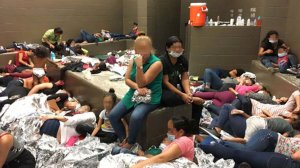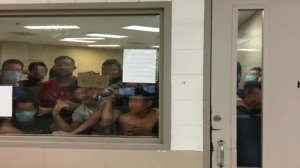In one photo, one of 88 men in a cell meant for 41 presses a piece of cardboard against the window, with the word “help.” In another, a man lowers his head and clasps his hands as if in prayer. And in a third, a woman wearing a surgical mask presses both of her hands against the glass.
The images were released Tuesday by U.S. government inspectors who visited facilities in South Texas where migrant adults and children who crossed the nearby border with Mexico are processed and detained.

As public outrage grows over the conditions in which thousands of people — some no more than a few months old — are being held by the U.S. government, the reportoffered new cause for alarm. It quotes one senior government manager as calling the situation “a ticking time bomb.”
“Specifically, when detainees observed us, they banged on the cell windows, shouted, pressed notes to the window with their time in custody, and gestured to evidence of their time in custody,” the report says. BuzzFeed first reported on a draft version of the report, which blurs most faces in the photos.
An autopsy report also released Tuesday confirmed that a 2-year-old child who died in April had multiple intestinal and infectious respiratory diseases, including the flu. Wilmer Josué Ramírez Vásquez is one of five children to die after being detained by border agents since late last year. Two of the other four also had the flu.
The autopsy report says Wilmer was in “respiratory distress” April 6 when he was taken to an emergency room. His grandmother, Dorotea Castillo, told The Associated Press in June that Wilmer was already in delicate health when they left Guatemala, and crossed into the U.S. with a high fever and difficulty breathing.
The Border Patrol said after Wilmer’s death that it had detained Wilmer and his mother for three days when she told agents her son was ill. It didn’t specify if that was the first report or sign that Wilmer was sick. The agency did not respond to follow-up questions sent Tuesday.
Pediatricians called again on border authorities to accept their offer to provide volunteer medical care to migrants in detention. U.S. Customs and Border Protection rejected the offer. Roger Maier, a CBP spokesman, said anyone who needs medical attention beyond what government and contract staff can provide is taken to a local hospital.
The Border Patrol made 132,887 apprehensions in May, including 84,542 adults and children traveling together. With long-term facilities for adults and children at capacity, President Donald Trump’s administration has said it has to hold people in unsuitable Border Patrol facilities for much longer than the 72 hours normally allowed by law.
Auditors from the Department of Homeland Security’s inspector general visited five facilities and two ports of entry in South Texas’ Rio Grande Valley, where more people cross the U.S.-Mexico border illegally than any other section. The dangers there were recently illustrated in images shared around the world showing a young father and daughter who drowned trying to enter the U.S. by crossing the Rio Grande.

In a statement included in the report, DHS blamed “an acute and worsening crisis” and said it had tried to expand detention capacity and improve the conditions under which migrant families are held. DHS did not immediately respond to a request for further comment from The Associated Press.
The photos provided in the report were digitally manipulated to obscure the faces of the prisoners and therefore did not meet the AP’s standards for distribution.
Immigrant advocates blame the Trump administration for refusing to promptly release families, children and people seeking asylum, leading to increased numbers of people detained.
The report details several potential violations of federal law or Border Patrol standards:
— Two facilities inspected had not provided children access to hot meals until the week that auditors arrived. Some adults were only receiving bologna sandwiches, causing constipation and in some cases requiring medical attention.
— Of 2,669 children detained by the Border Patrol in the region, 826, or 31%, had been held there longer than 72 hours. More than 50 children under the age of 7 were waiting to be moved to long-term facilities, some of them for more than two weeks. In one photo, women and children appeared to be sleeping on the ground under Mylar blankets.
— Many adults hadn’t showered despite having been held for as long as a month. Some were being given wet wipes to clean themselves.
The report also detailed “security incidents” at multiple facilities, including one case in which detained migrants refused to re-enter their cell after it had been cleaned. People detained have also in some cases clogged toilets with their Mylar blankets and socks in order to be let out of the cells.
The report was released a day after a group of Democratic congressmen visited the Border Patrol facility in Clint, Texas, on the other side of the state, where lawyers previously reported some 250 children being detained in squalid conditions.
One of the congressmen, U.S. Rep. Joaquin Castro of Texas, alleged that a woman told them she was instructed to drink water from a toilet. Castro shared a video he took from inside one facility.
U.S. Rep. Elijah Cummings, a Maryland Democrat who chairs the House Committee on Oversight and Reform, said top Homeland Security leaders would testify before his committee next week on the treatment of migrant children.











